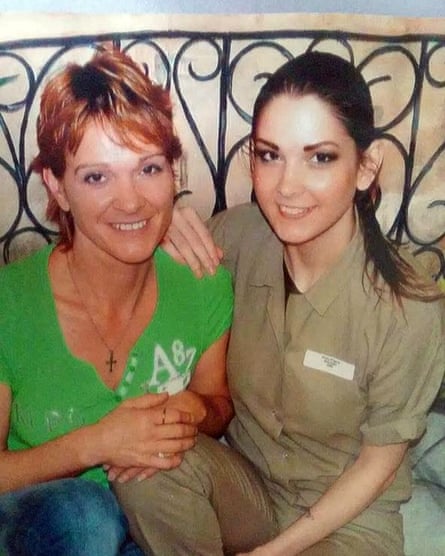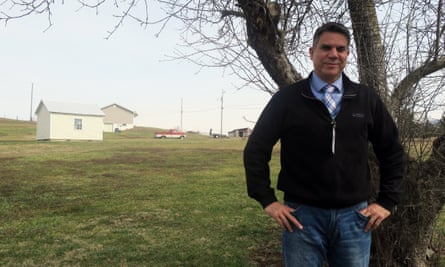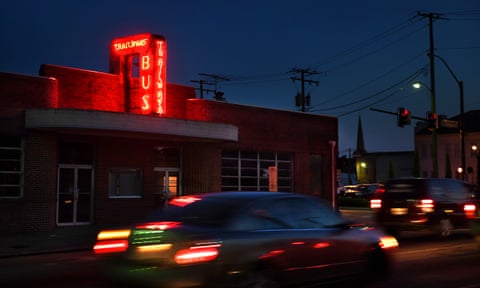Breanne McUlty knew about Dr Rajan Masih long before she met him.
McUlty was still a teenager, hooked on whiskey and methamphetamine and soon to be dealing heroin, when she first heard about the doctor. Masih was a respected, prosperous family man running a hospital emergency room.
But McUlty knew from those of her friends who preferred to get high on painkillers – effectively heroin in a legal pill – that Masih was the go-to doctor for illicit opioid prescriptions in Grant County, West Virginia.
“Everybody knew him as pretty much the top drug dealer around here,” said McUlty “Maybe he got greedy. Everybody makes mistakes just like I did. He’s a decent person now, trying to make up for it.”
But Masih was more than a dealer. The doctor was also hooked on the pills he was feeding to other opioid addicts.
The lives of the privileged physician and the young woman whose upbringing set her on the path to addiction and selling hard drugs while she was still a child eventually crossed after each was freed from years in prison. They shared a parole officer who drug tested them, and approved where they lived and worked. They also shared a belief that incarceration saved them from early deaths.
“Arrest was the best thing that could have happened to me because I could not and I would not stop,” said Masih. “It was a downward spiral and I would have died.”
McUlty was 25 when she finally returned to her home town of Petersburg, the capital of Grant County, two years ago. Masih was 51 when he was released a few months earlier, stripped of his licence to practice medicine and with little idea what his future held in the struggling rural town of about 2,500 people.
Freedom from prison and drugs gave the two former inmates clearer perspectives on the epidemic that has hit their state harder than any other. It has by far the highest overdose death rate in the country at double the national average. Opioids kill more West Virginians than guns and car accidents combined.
The crisis reaches across generations, from former coal miners to students, although doctors increasingly notice a trend among the young to go straight to heroin whereas many older people come at it through prescription opioids.
In their own ways, McUlty and Masih determined to do what they could to combat the epidemic they contributed to. But they have been daunted by the scale of the challenge.
“I came home from prison thinking I was going to make a difference. I’m going to help all these people,” said McUlty. “Because I’m different now they’re going to see that they can be different too. It was a slap in the face when everybody was: ‘Screw you. You think you’re better than us now’. I think everybody accepted their fate. Nobody really wants help. The people I really want to get to, they just turn their heads. They say: ‘I’m not that bad off. I can stop when I want to stop’.”
‘I just wanted to be free’
Masih, who was born in Chicago and is married to a former police officer, was working as an emergency room doctor a decade ago when he crashed a racing car and hurt his back. He self-medicated with samples of an opioid painkiller, hydrocodone.
“It was unbelievable. Not only did it take my pain away but I immediately felt this is amazing. I like my job. I like talking to people. I’m not irritated and angry with patients all the time,” he said.
When the samples ran dry, Masih wrote fake prescriptions in the names of his mother, wife and children.
“After a few months I crossed that line where if I don’t have pills every four to six hours I’m in withdrawal. I have no energy. Everything hurts. I can’t think straight. Just getting more pills would immediately bring me back to my new normal,” he said.
Masih was well aware of the danger of addiction and conducted ultrasounds on his own liver to check for damage. But he kept taking the pills even as they left him ever more physically and emotionally detached from his family of five children.
“I wanted my life back. I’d look at people sitting on their porch, playing with their kids. Here I am obsessed with getting my next pills and staving off withdrawal. I was caught in this trap. I just wanted to be free,” he said.

By then, Masih had gone from addict to dealer in a state with the highest demand for prescription opioids in the country. Rogue doctors across West Virginia were prescribing dangerous quantities of pills to just about anyone who paid cash. In some parts of the state, doctors ran “pill mills” that did nothing but issue prescriptions for opioids, making millions of dollars.
Drug companies were pouring opioids into West Virginia, delivering 780m painkillers into a state of just 1.8m people over a five year period to 2012, according to an investigation by the Charleston Gazette-Mail.
Demand grew in part out of the physical toll of coal mining. Miners long used moonshine, marijuana and prescription pills to cope with the stresses and pain of work underground. But there had never been anything like the hydrocodone and oxycodone flooding onto the market in the 1990s. They were so effective and easy to get that miners often passed them out among themselves. Few were told how addictive these drugs were.
Before long, opioids were so widely prescribed doctors noted rising addiction among people who had taken them to deal with relatively minor conditions such as broken bones. The drugs were in so many bathroom cabinets that word spread among young people looking to experiment that opioids provided a powerful high. The pills began to displace meth amphetamine which had long been used as inoculation against the struggles of life in marginalised communities.
“Drugs like oxycodone, hydrocodone, they treat all kinds of pain,” said Masih. “The pain of being a single mom looking after a kid. The pain of that person who doesn’t have a job. The pain of, I’m 20 years old, nobody cares. The pain of being bullied. The pain of I’m gay. It treats all of those pains. It’s less about physical pain. It’s more about this social angst of there are no jobs. The economy’s crushed. This is a state that’s been marginalised in so many ways. Drugs are a solution to that.”
Opioids proved by far the most deadly.
Things fall apart
By the time Masih sank into addiction, McUlty was dealing in drugs even though she was barely in her teens.
She remembers her father using cocaine and meth amphetamine, and drinking heavily. Then he branched into prescription opioids. “He couldn’t get out of bed without them,” she said.
Eventually the abuse to his body put him in hospital in a coma.
Her mother left, taking her younger sister. McUlty describes struggling to find food in the house but said there was a steady stream of users and dealers passing through.

Drugs were so much part of the daily routine that when someone asked the 15 year-old to sell a bit of morphine it seemed a natural thing to do. Before long she was dealing regularly. By then, McUlty was also regularly drinking liquor.
McUlty’s father confirmed her description of his dependence on drugs and alcohol, and the part it played in pushing his daughter along the path of dealing and addiction. Although Petersburg is a small town, she managed to avoid arrest for drugs but was convicted of stealing a pair of shoes. She was also expelled from school for disruption.
At 16 she was pregnant. By then McUlty was homeless. “I was on probation. Some anonymous call said I was pregnant and I was walking the streets. Sometimes I was barefoot and looked helpless I guess. My dad was driving by one day and saw me and said ‘You’ve got a court order’ and gave me the papers,” she said.
The court made McUlty agree to move into a shelter for teenage mothers but she soon fled to Maryland where her daughter was born. Then she returned to Petersburg and slipped back into the old routine. “I really didn’t think there was a different way. I thought it was always going to be like that,” she said.
For a while, the important thing for McUlty was to hang on to her daughter and she got back together with her daughter’s father. But things quickly began to unravel. Her boyfriend was a heavy drug user and they fought a lot. McUlty moved in with her grandparents but was desperate for money so she started selling crystal meth.
She went to a party and woke in a cupboard with no memory of the previous few hours but certain she had been raped. It never occurred to her to call the police. Instead she fell back on crystal meth.
“It gives you a lot of energy but after a while your mental health starts floating away. You get really really thin. It eats away at your teeth. It messes with your brain. You start imagining things. Hallucinating. You hate it but can’t stop,” she said.
Salvation for Masih came from a pharmacist who called the Drug Enforcement Administration (DEA) with suspicions about his prescribing. Armed DEA agents arrested him at the emergency room.
“They asked me questions about an individual who overdosed on medications I prescribed. This individual died. They asked me: ‘Did you write these prescriptions?’. I said: ‘Yes I did’,” he said.
A DEA agent testified that of the 16 people who died from opioid overdoses in the area in the two years before Masih’s arrest, three were his patients. Masih prescribed one of them hundreds of opioid pills, far above recommended dosages, immediately before the man’s death. He also prescribed the fentanyl patches that killed a woman.
Masih faced 136 charges but reached a plea deal admitting a single count of illegally supplying opioids to a patient he knew to be injecting them. The doctor was jailed for four years and lost his medical licence.
“I think I got a very fair deal out of the whole thing,” he said. “I 100% accept responsibility for what happened to me.”
Many in Petersburg speak highly of Masih. Hundreds of people signed an online petition praising him as a doctor and calling for his release. Others are more sceptical, including the county sheriff who regards Masih as guilty of more than he was convicted of but said the former doctor turned his life around and is respected in the town.
Masih says he prescribed “recklessly” but not intentionally.
“Recklessly to me means my barometer is off because I just took six hydrocodone and obviously this is not a sane decision making process,” he said.
Does he feel responsibility for the deaths?
“I don’t. I realise that many people became addicted to drugs or dependent on drugs as a result of me. I believe that people may have overdosed on medications that I prescribed. But these were people who already had been on narcotics for years through other doctors. I basically continued to do what their physicians had prescribed for them,” he said.

‘Pure souls turn black’
By the time Masih went to prison in 2010, the authorities were finally responding to the epidemic and cracking down on pill mills. That drove up prices on the black market and cheap heroin filled the undiminished demand.
McUlty did not miss the opportunity. She hooked up with Mexican dealers in Columbus, Ohio, a five hour drive west. She turned a 3.5g “eight ball” of heroin for $600 into several thousand dollars worth of individual hits on the street in Petersburg.
“It was very easy. I had mules go to Ohio with me. They would use condoms to hide it. Put it inside themselves. We would give addicts money and some of the drugs to take us. They’d do anything,” she said. “There is just so much money to be made in West Virginia, it’s kind of hard to walk away once you get the hang of it.”
Before long, McUlty reckons she was the leading heroin supplier in Petersburg. She was 19 years old.
By then, McUlty had little contact with her daughter. If she had a family at all, she reckoned it was the Mexican dealers in Ohio. At the same time she was still using crystal meth.
“I was losing my mind, going crazy on it. I was watching the people I was selling meth to waste away and knew that would happen to me,” she said. “Addiction brings out the worst in people. Pure souls turn black. Even with the nicest person, the happiest person. They end up robbing and stealing. Hurting people.”
The end came when the police stopped a car she was travelling in and found a meth lab.
“We all went down because everybody was saying: ‘It’s not mine’,” she said. “One guy actually had business cards saying: ‘Can’t get up and go?’ with a picture of crystal meth on the card.”
A few months later, McUlty learned that another woman in the car was cooperating with the police. McUlty wrote her letters from jail warning that she would get killed and threatening to burn the woman’s house down.
“I guess if I’d had the chance, as mad as I was, I probably would have done something. But I don’t know if I would have burnt their house down,” she said.
McUlty was jailed for four years.
“Federal prison saved me. This was my way out. I grew up in prison,” she said.
For the first time in years, contact with daughter became more important than getting a fix or doing a deal.
“I wrote her every single day. I wrote her poems. I drew her pictures,” she said.
But McUlty did not see her daughter. Her grandmother, who was caring for the child, cut off contact. The young mother found missing her daughter the toughest thing about incarceration.
Prison helped Masih realise the scale of the epidemic. The former physician got an education from other inmates on the web of deception used by addicts to “doctor shop” in search of prescriptions using fake ID’s of changing one letter of a surname to bypass prescription monitoring programmes. Women used maiden and married names to double up on prescriptions. Artificial urine pumped through false penises to pass drug tests.
But it was the dealers who were most organised. They shuttled groups of hard up elderly people to the doctor for opioid prescriptions, paying them a few hundred dollars for half of the pills. And they brought buyers in from out of state by the bus load.
“The medical community has no idea how organised this is as you sit in your office. It was just unbelievable to me,” said Masih. “To someone who’s a diligent drug diverter, this is a business. They are able to see any number of doctors and scam them into prescriptions.”
Masih said they were not the only ones scamming. Pharmaceutical companies pushed opioid drugs designed to deal with pain caused by cancer as appropriate for less severe conditions, all with the complicity of federal medical institutions.
Today, he finds it astonishing that most of his education on treating pain came from pharmaceutical company salesman. Masih attended courses on diagnosing headaches, skin cancer and end-of-life care but said the only information he received about opioids was from a representative of Purdue Pharma, the manufacturer of the powerful OxyContin pills at the heart of the epidemic.
The salesman, who had no medical training, arrived each week with pizza to assure Masih that claims of addiction were exaggerated and to press him to prescribe more of the drug.
“I got the bulk of my education about opioid narcotics from drug reps. They’d come in with a glossy brochure and tell us, you need to be writing this now,” he said. “It was aggressive.”
Among Purdue’s tactics, state investigators later found, were salesmen threatening to back legal action against doctors who resisted patients’ demands for OxyContin.
“I feel a tremendous sense of betrayal,” said Masih. “These companies misrepresented the research, glossed over things. That’s a travesty. These people have just profited endlessly from firing the gun off the shoulder of doctors.”
Complicity went down the line. The DEA’s investigation of Masih led to the prosecution of a local pharmacy, Judy’s Drug Store, for filling illegitimate prescriptions. It paid a $2m civil penalty to settle the case in 2014. That in turn prompted a wider investigation of a drug distributor, McKesson, for failing in its legal obligation to monitor deliveries of prescription drugs to pharmacies. McKesson paid $150m to settle the case earlier this year.
Masih emerged from prison determined to do apply the lessons he learned.
“Prison changed me. It made me have a life of gratitude. It’s given me a purpose. I want to give back. I caused a lot of damage,” he said.
Starting over
Today, Masih gives talks on ways to roll back the epidemic by changing opioid prescribing. He has patented a system to monitor prescriptions through retina scans and thumbprints to curb “doctor shopping”. He has also written two textbooks on what he learned about all the ways dealers and addicts get prescription drugs, and on substance abuse in prisons.
Masih struggled to find work as a convicted felon stripped of his medical licence but last year landed a post running an addiction recovery centre in Petersburg.
“What we are seeing is that there are those older people who started with narcotic pain pills, transitioned to heroin because it’s dirt cheap. Then there are those 18 or 20 year olds who went straight to heroin. They started smoking it. Very rapidly it evolves to injection,” he said.
What most alarms Masih is that for all the political statements about combatting the opioid epidemic, he doesn’t see any real change in the medical profession.
“Nothing has changed. Everyone’s radar is up but at the end of the day we know the number of prescriptions nationwide have increased from 2015 to 2016,” he said.

McUlty too has a better understanding of the epidemic now she is not in the midst of it.
“A lot of people I’ve talked to, they started doing drugs because of their situation. Products of their environment or something bad happened to them and they’re just trying to get over the depression. Sometimes they just look for entertainment. That’s what being American is about. I think people just live to party and don’t think about the things that really matter,” she said. “I know a lot of the people started really getting addicted to pain killers because a lot of the jobs in West Virginia you get injured a lot. A lot of labour. The doctors are just handing them out like candy. It just got worse. Their kids started using them.”
McUlty has rebuilt her life. Her daughter is living with her again. Last year she had another child, a son with her fiance who is also a recovering addict. She had trouble landing a job because of her felony conviction but eventually found work in a chicken factory, cleaning birds for $9.50 an hour.
She is part way through a photography course and is working on a film about her experiences. She is also volunteering to help refugees. Her father has fought back against addiction. He got onto medication and off the drugs. Still, the tragedy did not stop after prison. McUlty watched her brother, Bryan, die in hospital from heart disease brought on by the use of dirty needles.
McUlty works to educate whoever will listen about drugs but says not many want to hear. She offered to give a talk to students at her former high school but the administration has yet to take her up on the offer.
“I never could get the word out. It seems like there’s more hopelessness than any one person can do anything about. I try,” she said.
She is not optimistic about Petersburg.
“You can’t trust anybody in this town. It’s a wreck. If you want to stay clean, you’ve got to stay alone,” she said. “I don’t know what can be done. I don’t think law enforcement can put a stop to it because people are always going to find a way. Even in the county jail, people were high. They smuggle it in. Pills. Weed.”
McUlty plans to leave after the summer and move to Atlanta where her fiance has transferred his job at a sanitation company.
“When I was a teenager, you’re not somebody unless you’ve got drugs in your pocket. I don’t want my kids to grow up in the same situation. I know it’s everywhere but here it’s everybody. I want to get away from that,” she said.
